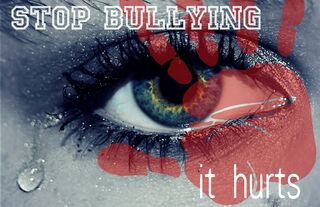Bullying
10 Tips for Healing From Bullying
Support for those who have been bullied and those who have witnessed it.
Posted June 30, 2021 Reviewed by Ekua Hagan
Key points
- No one is fully removed from bullying, so it’s in everyone's best interests to understand how to confront it.
- Bullies are usually immature and narcissistic. They choose victims at school, at work, in retirement homes, and even in their own homes.
- Strategies to deal with bullying include documenting action steps and finding additional strength by pursuing one's personal interests.
Somewhere along the line, the term “conflict resolution” replaced peacemaking. It reminds me of how Mother Theresa once said that she wouldn’t attend an anti-war rally, but she would attend a peace march.

Bullying hurts. It kills. And it impacts everyone — you can be a victim of it, responsible for it, an observer of it, or somehow related to it. The point is that no one is fully removed from it, so it’s in all of our best interests to understand what we can do to confront it.
This is a blog post and by no means an exhaustive account about what you can do. However, there are some tips that can consistently help. I’m placing them here for you. If you are a victim, try them and please also reach out and seek help. If you know someone that is a victim of bullying, please reach out to them, support them, and help them find help.
- Breathe. Breathing is often overlooked during anxious situations. We begin to pant or stop our breathing altogether. Take deep breaths (at least four or five of them) and re-center and ground yourself. This will calm you while sending needed oxygen into your bloodstream and harnessing your adrenaline so that you can think and react more clearly. Get in the habit of doing this when waking up and going to sleep along with several times during the day.
- Do not isolate yourself. It is tempting to withdraw and not share what’s happening to you. Now more than ever, you need people around you. Talk to family members. Find support. Join a support group. Find friends that like activities that you like (book reading clubs, outdoor hiking groups, church, gym, other hobby groups, etc.). Make sure to surround yourself with people who help build your self-esteem.
- Realize that you are in control of you. Bullies like to take control by manipulating and scaring you. You can lessen their impact by taking control of you, your actions, your thoughts, and your responses to them. When you take control of you, you fan the flames of inner strength and resilience.
- Make a plan. Find action steps to take to deal with the bullying. Document what is happening and write down what you can do to stop it. Enlist help from loved ones and/or a professional to assist you in figuring out your options.
- Find additional strength in things that matter to you. Think about things, people, places, and dreams you love. Cultivate those parts of yourself as that is what makes you unique and special. Feeding your passion takes power away from bullies.
- Learn something new. Take a class at the community center or community college in something new, like pottery, writing, computers, art, yoga, foreign language, cooking, etc.
- Nurture yourself. Remind yourself of your strengths and gifts. Write them down. Do things that you love to do and tell yourself positive things. (Get rid of the negative self-talk.)
- Have faith and believe in the power of transformation. Yours and the world’s transformation, that is. Give yourself self-love and find the strength to make a difference.
- Keep healthy boundaries. Beware of people that make you feel guilty, less than them, or continually make it about them and ignore your feelings.
- Advocate on others’ behalf. This helps build your strength and makes you feel empowered (and not alone) along with developing your empathy and compassion for others (because the worst way a bully can control you is if they turn you into them).
When to seek help
If you or someone you love is continually reliving the abusive event, has become hyperalert and easily startled, has developed a hopeless outlook on life, is dealing with anxiety, nightmares, insomnia, lack of concentration, is gaining weight and/or has lost their appetite, is acting out with self-sabotaging behaviors (cutting, drinking, engaging in risky behavior, sexually acting out, etc.), and especially if you/they are having any thoughts of suicide or killing someone else, seek help immediately.
Bullying has numerous victims in schools, workplaces, communities, retirement homes, and even in your home with your loved ones. Bullies are toxic and are bent on control. They do not see their victims as people. They are in a game to win and sometimes their displayed remorse is part of their game. Bullies are usually immature, narcissistic, and highly competitive. They may not like themselves and be out of touch with their true emotions. They may have mental health issues and can swing from being loving and caring to dangerous and cunning.
Keep your boundaries and don’t reinforce their bullying. Don’t laugh when they tease another person. Don’t engage them or bully along with them. Say no and help stop the tide of bullying. If you see someone bullied, reach out and give them your care because we can all do something to help heal the pain from bullying.
If you or someone you love is contemplating suicide, seek help immediately. For help 24/7 contact the National Suicide Prevention Lifeline, 1-800-273-TALK, or the Crisis Text Line by texting TALK to 741741. To find a therapist near you, see the Psychology Today Therapy Directory.


